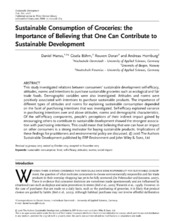Sustainable consumption of groceries: the importance of believing that one can contribute to sustainable development
Peer reviewed, Journal article
Published version

Åpne
Permanent lenke
https://hdl.handle.net/1956/12022Utgivelsesdato
2016-02-26Metadata
Vis full innførselSamlinger
Originalversjon
https://doi.org/10.1002/sd.1615Sammendrag
This study investigated relations between consumers’ sustainable development self-efficacy, attitudes, norms and intentions to purchase sustainable groceries such as ecological and fair trade foods. Demographic variables were also investigated. Attitudes and norms were positively associated with intentions to purchase sustainable products. The importance of different types of attitudes and norms for explaining sustainable consumption depended on the facet of purchasing intentions that was investigated. Self-efficacy explained variance in purchasing intentions over and above attitudes, norms and demographic characteristics. Of the self-efficacy components, people's perceptions of their indirect impact gained by encouraging others to contribute to sustainable development showed the strongest association with purchasing intentions. This could mean that believing that one can have an impact on other consumers is a strong motivator for buying sustainable products. Implications of these findings for practitioners and environmental policy are discussed.
